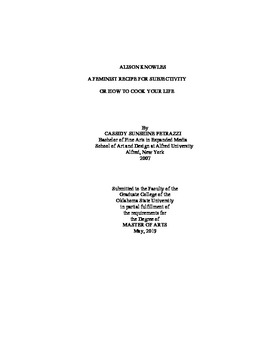| dc.description.abstract | This study shows how the work of contemporary artist and founding member of Fluxus, Alison Knowles (b. 1933) performs choice, meaning, and subjectivity into being through holistic and temporally based corporeal experience - and how the reception and experience of the work creates the potential for transformation in the body of the receiver. I consider three of Knowles' works including #2, Proposition, Make a Salad (1962), Potage Sec (1989), and Bread and Water (1992-1995). I argue that each artwork is an ontological exercise, providing the viewer with a way to experience a new conception of being in the world. Through the use of the quotidian, the act of cooking, the ecological implications of sustenance, and their connection to our human becoming, Knowles' work connect the viewer to their life and place in the world. My methodology utilizes feminist-based phenomenology, pragmatism, hauntology, and folklore studies. I argue that it remains a critical enterprise to consider Knowles from a feminist perspective, more so from a Beauvoirian one, as the works are an expression and experience of temporality, calling attention to the process of being to becoming through time. There have been a handful of scholars who have discussed Knowles' proto-feminist stance. While these scholars have begun considering Knowles' work through a feminist lens, it is important to note that this has not been analyzed in detail - nor has there been a consideration of her work in concert with Beauvoir. While it is critical to understand and revisit Knowles' work from her early period, it is increasingly important to look to more recent periods of her career as well. The culture of reclamation threatens to eclipse the mid-career work of an artist who has continued her practice for over sixty years. It is with this understanding that this paper analyzes two of Knowles' later works, neither of which have received significant scholarship but deserve focused attention. Consideration of these three works points to the critical importance of cooking and temporally based mundane processes that have the power to transform one's perception of their own subjectivity and experience of lived time. | |
